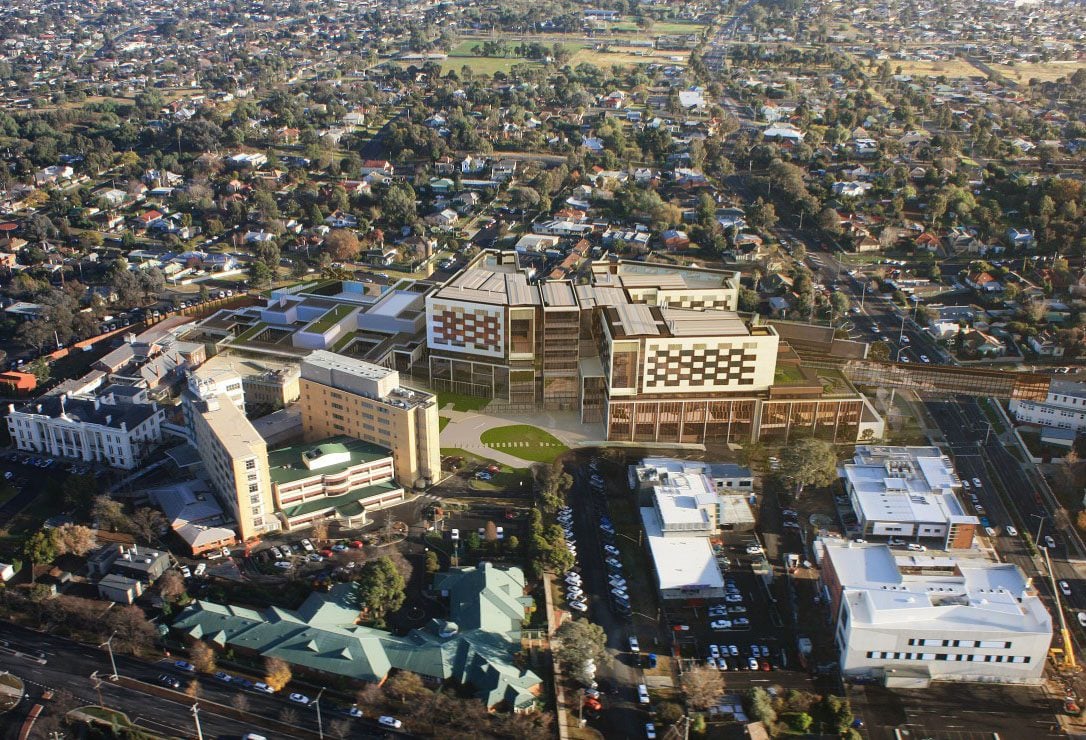Hospitals are a key driver when Australians choose where to live.
MWH Global conducted a liveability survey with 1000 Australians in 2013. 53% of the respondents listed “better access to healthcare infrastructure” as one of the most essential factors in improving a location’s liveability.
In this blog, we are going to dive into data and find out how much a new hospital can impact local property values.
2 Hospitals
We have got 2 cases today – Albany’s new hospital, which first opened in 2013, and Bendigo’s new hospital, which opened in 2 stages during 2017-18.
– Albany Health Campus
When the $170m Albany Health Campus opened in May 2013, it was the biggest regional hospital in WA and was meant to reduce the number of patients required to travel to Perth for treatment.
How has Albany’s property market been going since 2013? We compare it with two neighbouring regional WA cities: Esperance and Bunbury.

The above chart shows that the Albany property market has been more resilient than the other two cities in the past decade. Esperance and Bunbury’s property prices were both impacted by the ending of the mining boom and dropped significantly for a few years since 2015. However, Albany’s house price remained stable during that time, achieving much higher 10Y growth in both value and sale volume compared to the others.
The rental market saw similar trends (below chart). Following the establishment of the new hospital, Albany’s rental prices surged by almost 1/5 in 3 years (2013-16) while the other two cities didn’t improve much. From 2016 on, while Esperance and Bunbury’s weekly rents were declining, Albany remained stable. In the 10year after the newhospital’s opening, Albany achieved an impressive 36% rental growth while theother two didn’t even make 15%.

– Bendigo Hospital
The $630m new Bendigo Hospital opened its first stage in early 2017 and fully opened in late 2018. It was the largest regional infrastructure development in Victoria’s history.
Let’s see how Bendigo’s house market has been performing before and after the opening of the new hospital.

The above chart shows that before the opening of the new hospital, Bendigo’s house price growth (2.6% p.a.) was slightly lower than Shepparton’s (2.8% p.a.). After the full opening of the new hospital, the annual sale volume rose by 18%, indicating much elevated housing demand. The lifted demand along with the proximity to a big new hospital could be among the reasons why Bendigo’s house price started surging 1 year earlier than Shepparton during the pandemic.
In the rental market, we see a notable surge from 2018 to 2019 in rental price following the full opening of the new hospital (below chart), waking Bendigo’s rental market up from a 4-year stagnation since 2014.

What does a new hospital bring?
We are not saying that the relatively faster growth of Albany and Bendigo was all because of the new hospitals – Many factors, such as local economy, other investments, building activities, and market cycles, have been working together to decide the property market growth. However, the new hospitals have undoubtedly played an important role by bringing in more employments, business opportunities, housing demand, and more.
– More employments
Both the construction and the operation of a new hospital create employment opportunities. Taking the Bendigo Hospital as an example, during construction, the project created some 5,000 job opportunities and a peak of 1,000 construction workers on site during Stage 1. After its full opening, around 220 more full-time and part-time employees were required on top of the old hospital’s staff.
– More business opportunities
The new hospitals have “ripple effects” on local businesses as well. The goods and services hospitals purchase from other businesses create additional value for the local community. A 2016 study by the American Hospital Association finds that every dollar spent by a hospital supports roughly $2.30 of additional business activity, and each hospital job leads to around 2 additional jobs for the supporting businesses.
– Higher housing demand
As mentioned at the beginning of this blog, better access to healthcare infrastructure is one of Australians’ top needs when choosing where they live. The two case studies also show that once a new hospital is established, the purchasing demand and rental demand would both increase in the next few years. High demand usually indicates fast value growth (if supply level is stable).
However, it is important to note that impact of a new hospital does not last forever. Once the demand and supply find a new balance and the value-added is fully reflected by the property price, the growth rate will normalise again. We have elaborated on it in our previous blog Why Stations, Schools, Shops, Beaches and Distance to CBD should NOT be Your Number One Focus when Investing.
Also, the impact of new hospitals on regional cities are more significant than to metro areas, as the metro economies and property markets are way more complex. One example is the new Northern Beaches Hospital (opened in 2018) and its surrounding region, the Sydney SA3 Warringah. The property price growth of the region before and after the opening didn’t seem much different from its neighbours (below chart).

Therefore, why not consider new hospital developments or significant expansions as a reference to identify potentially robust markets, especially in regional areas. Some of the new regional hospitals that catch our eyes are:

The InvestorKit buyers’ agency does not only analyse market numbers, but also examine local economies, infrastructure pipelines and more to identify the next fast-growing market for our clients. Would like to buy your next investment property with our research? Click here and request your 45-min FREE no-obligation consultation today!
.svg)
